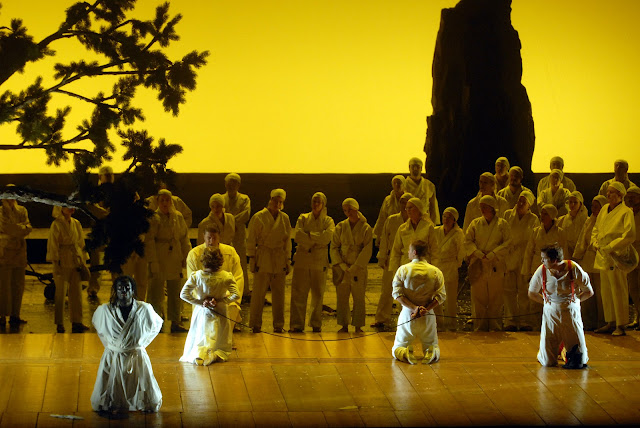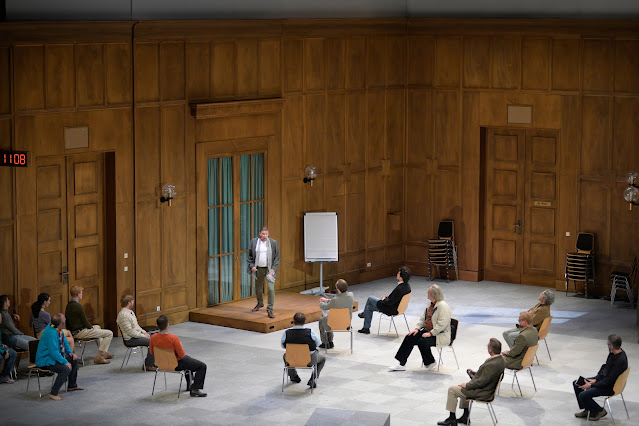 |
| Images: Monika Rittershaus Robert Storch (Philipp Jekal), Christine (Maria Bengtsoon), Franzl (Elliott Woodruff) |
Robert Storch – Philipp Jekal
Christine – Maria Bengtsson
Franzl – Elliott Woodruff
Anna – Anna Schoeck
Baron Lummer – Thomas Blondelle
Kapellmeister Stroh – Clemens Bieber
Notary – Markus Brück
Notary’s wife – Nadine Secunde
Commercial Counsellor – Joel Allison
Judicial Counsellor – Simon Pauly
Chamber Singer – Tobias Kehrer
Resi – Lilit Davtyan
Designs – Rainer Sellmaier
Lighting – Stefan Woinke
Video – Jonas Dahl, Janic Bebi
Dramaturgy – Jörg Königsdorf
 |
| Christine, Robert, taxi driver |
The second panel of Tobias Kratzer’s Strauss triptych for the Deutsche Oper, following last year’s Arabella, proves a worthy successor. A relative rarity for reasons no one seems able to discern, Intermezzo once again vindicates itself and its composer-librettist, who had learned his lessons well from his longtime collaborator Hugo von Hofmannsthal. Taking an intelligent, but not the most predictable, line from young love – it need not always be Der Rosenkavalier – through Intermezzo’s bourgeois marital comedy, next season heading toward the symbolic yet pronatalist transformations of Der Frau ohne Schatten, Kratzer’s partnership with the house and its outgoing music director Donald Runnicles turns out to have fewer clouds than, yet rest on similarly firm foundations as, that of the barely disguised Richard and Pauline seen and heard onstage as Robert and Christine Storch. Salome or Elektra might be a fitting way to undercut all that at the end, but such, at least for now, does not appear to be the intention. (In any case, the Deutsche Oper already has a splendid production of the former from Claus Guth on its books.)
A Zeitoper, if it is to be updated, needs careful handling in finding equivalents, at least if an abiding aesthetic of realism is to be retained as it is here. (It is not beyond the bounds of possibility to try something different, far from it, but it would be a tricky assignment.) Kratzer proves almost unerring in finding realistic contemporary settings for Strauss’s succession of bourgeois scenes. The Prater becomes an aeroplane (Straussair, with ostrich emblem play-on-words) journey home. The scene in Franzl’s bedroom has him watch online his father’s red-carpet, autograph-signing arrival at the Deutsche Oper (a little much, one might have thought, for either an opera composer or conductor, but perhaps that is the point). Such glamour contrasts poignantly with Pauline’s loneliness and her announcement of a broken marriage to the little boy. The game of skat takes place in a typical green room/Kantine. We see much of the orchestra and Donald Runnicles on film during the interludes, heightening the wonders of metatheatricality—and, quite simply, an excellent chance to see the players at close quarters.
 |
| Baron Lummer (Thomas Blondelle), Christine, others |
Earlier on, Robert leaves domestic ‘bliss’ in a taxi absurdly overfull with baggage, driver waiting patiently, cigarette in hand. Subsequent text messaging between the two of them proved a rare instance of adept operatic reference to that world. Ironically, for an opera claimed by some to be ‘embarrassing’ – perhaps accusers should look instead in the mirror – the scene turns out, unlike most such attempts, to be anything but; it strikes a fine balance between irritation and genuine, communicative emotion. The ski-slope collision between Christine and the Baron is transferred to behind the motoring wheel. I could not help but find the transfer of the ensuing scene at the Grundlsee Inn to a hotel bedroom – there can be no doubt what is meant by the ‘dancing’ on which Robert has given up – something of a miscalculation: it made much of what happened later between the characters, especially in their dialogue, very difficult to understand, if not quite incomprehensible. Even that, though, was handled on its own terms with a strong sense of theatrical realism, Personenregie crucially alert throughout.
 |
| Notary (Markus Brück), Christine |
Kratzer, moreover, responds to Strauss’s loving (without being too self-loving) self-quotation and allusion with twofold references of his own. Elektra and Der Rosenkavalier on film are further doubled by Christine’s choices from her costume wardrobe, that dressing up being in turn pressed upon the Baron (initially dressed as Kratzer). So much opera is about disguise and the assumption of roles in one way or another. Here we receive a welcome invitation to reflect on that, almost as our own minds will, though with guidance for those who need or wish it. No one, surely, could miss either the craziness or the sincerity of Christine’s metamorphosis into axe-wielding Elektra when she strikes her blows for womankind against the hapless Notary in his office. The ‘natural’ order of things is restored and perhaps lightly mocked by having Christine, conducted by Richard, sing her part of their closing love duet to an assembled audience in front of acted orchestra. I hesitate, no decline, to defend the sexism, though frankly what would one expect in a work so much, so avowedly, of its time? Straussian irony, though, will always be present for those with ears to hear; that certainly includes Kratzer, Runnicles, and a strong cast. For those who do not, there are many other ways to spend three hours of their time.
 |
| Robert, Stroh (Clemens Bieber) |
The orchestra for which Strauss calls is small, verging indeed on a chamber orchestra at times. We certainly heard pinpoint precisio, and ‘ensemble’ sonorities that would more readily be classed modernist if penned by Schoenberg or Webern. What nonetheless struck most keenly and certainly most warmly were the swell and glow of the Deutsche Oper orchestra and not only in the interludes: miniature tone poems in their own right, a splendid formal innovation for which Strauss never seems to gain credit. That the orchestra and Runnicles are old Strauss hands, not least in tandem, should not have us take their idiomatic and dramatically meaningful musicianship for granted. It may have been gorgeous, but it was never for ‘mere’ gorgeousness’s sake, the composer’s strong aestheticist tendences notwithstanding.
 |
| Christine, Baron Lummer |
At least as much as any Strauss opera and more so than many, an Intermezzo performance will stand and fall not only by the orchestra but also by its soprano heroine. Veterans of great Strauss performances of the past will surely not be disappointed, at least not reasonably so, by Maria Bengtsson’s Christine. It is here, of course, that whatever Strauss’s everyday sexism – misogyny if you will, though it seems a little strong – is routed by his lifelong love for the soprano voice (and Pauline). Bengtsson made the role her own and also very much a creature of our own times, ultimately likeable through that earlier cited genuineness of emotion. How we felt with her at her darkest hour, however silly some of her other behaviour may have been. Kratzer’s direction of Elliott Woodruff as Franzl and indeed the boy-actor’s own performance helped here too. Philipp Jekal’s Robert was finely sung and acted, treading difficult lines of his own without in any sense trying to upstage his partner-in-crime. Thomas Blondelle’s Baron Lummer initially seemed a bit old for the role, but the revelation of him as directorial emanation brought him more clearly into his own; at any rate, this was a similarly good performance. Strong appearances in smaller roles from artists such as Clemens Bieber, Anna Schoeck, and Markus Brück likewise attested to thoughtful casting and direction. Assuming that performances of Intermezzo will, alas, continue to be rarities even in German-speaking lands, catch this if and when you can.
 |
| Final scene |
















